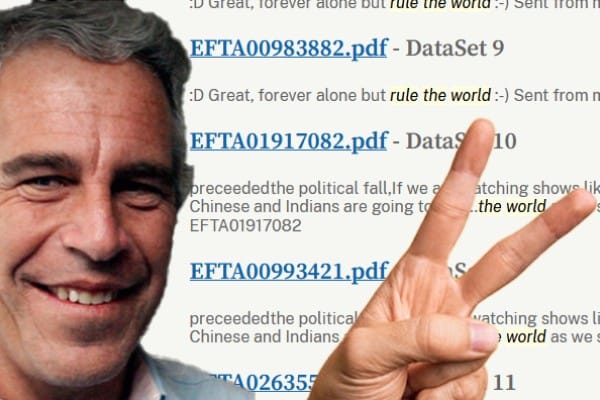The Censorship Grievance Industrial Complex: Part 1 - The Conservative Media Paradox

All right, so Matt Walsh has another deplatformed documentary out that you’re not allowed to see.
This one is in cinemas, too, so it’s even more widely unavailable than his previous film, What Is a Woman?, which was so blacklisted that Elon Musk, the new owner/operator of Twitter, did a little trickery to force it into every user’s feed which resulted in Walsh eagerly counting it as one of the most viewed films in human history because logging into Twitter at any point during that time counted as a view of the entire film even if it was for less than one second.
Still, if you haven’t heard of Am I Racist?, the second movie Walsh titles with a question he already knows the answer to, it’s because Walsh is being censored in a different way – the mainstream press isn’t going out and seeing the movie and reviewing it. Ergo, the mainstream media is afraid of the truth and is trying to bury the film.
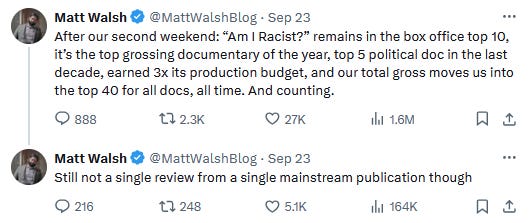
Now, Matt Walsh is being kind of disingenuous here as he is about most things, because the essence of his philosophy and that of his allies is that lying in the service of winning is always justified because people who disagree with him are ontologically evil and you can’t sin against evil. He doesn’t really care if liberals or critics or serious people don’t see his movie because they’re not the target audience. People who already agree with Walsh’s premise and conclusions won’t even pay much attention to the movie but they will go out and buy 12 tickets each for it.
This is because Walsh has a hack for being profitable that takes less effort than being rigorous or correct or even convincing, and that is being, ostensibly, censored.
Being censored in the modern day is a complex and contentious concept, ophanimous Venn diagrams of wheels within wheels featuring those who either do or do not know what censorship actually means, those who embrace it, and those who want to stamp it out. Some people say or maybe even think they want to stamp it out but don’t because it’s crucial to their business model.


The Daily Wire is in a strange kind of purgatory because as far as right-wing studios go they do seem to be earnest in their stated mission to create a parallel entertainment industry that is right wing and still successful under its own merits. At least, its heads Ben Shapiro and Jeremy Boreing feel like they’re earnest about that.
Nevertheless, it is almost universally agreed that their content is, at best, bland. I’ve seen a number of their movies and shows and the only one I thought was worth watching was 2020’s Run Hide Fight, a school shooting thriller. (I think my enjoyment of this movie was skewed by my low expectations because I was expecting a heavy handed conservative viewpoint on school shootings and their causes and solutions that, happily, never appeared. Instead, just kind of a dollar store teenage Die Hard.)
I really hope that Jeremy Boreing appreciates the fact that most people don’t reach for the low hanging fruit that is his surname when discussing his studio’s output. That’s the first and last time I’m going to gesture in that direction.

So therefore it’s inescapable that the studio owes its ongoing success to the fact that they are able to successfully market it as counter-narrative and unfairly sidelined and excised from the conversation. Censored, either directly and nefariously, or indirectly, though mainstream refusal to engage. The latter, audiences making a conscious and wilful decision not to support and consume someone’s media, is a concept that has been successfully marketed as being a form of censorship called cancel culture.
In short, if the Daily Wire ever did become mainstream and be forced to compete on its quality alone rather than its novelty, if mainstream reviewers actually did start reviewing Matt Walsh’s shitty documentaries, then the bubble would burst and the studio would blink out of existence in a plume of self-contradiction.
On some level they know this, which is why when people actually do review their media honestly, the Daily Wire and Matt Walsh in particular fight to have the reviews removed, through copyright strikes and other gatekeeping shenanigans.
Like any organism born into a hostile environment they’re finding a way to survive. It’s a very common marketing strategy. Justin Folk, the director of both of Walsh’s documentaries, made his breakthrough with a documentary called No Safe Spaces about how you’re not allowed to hear conservative opinions. The very creative poster…
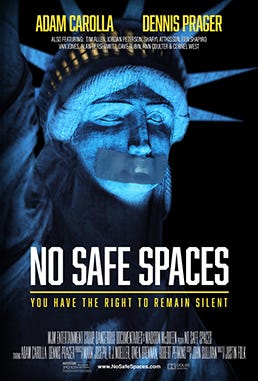
…nevertheless looks strikingly similar to the Mike Cernovich documentary on the same topic.
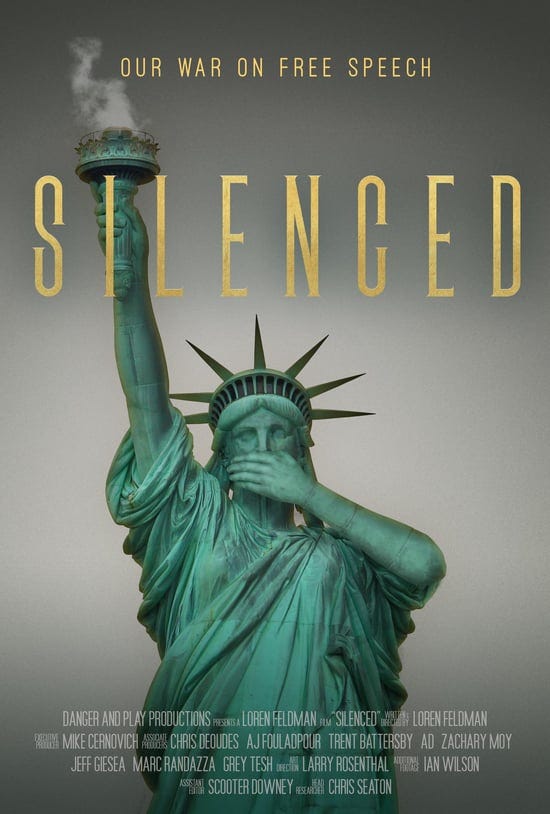
Marketing media under the false premise that the viewer isn’t supposed to be watching it, or someone’s trying to withhold it from them, or “they” wanted to ban it but the truth could not be contained, is a strategy as old as media itself. But why does conservative media consistently need to market itself as censored or forbidden, rather than good?
It’s got a lot to do with the fact that the strongly ideological right wing in the modern west don’t really understand narrative or documentary artforms. They try to reverse engineer it and what they create is kind of a cargo cult approximation. I don’t know why it is this way because it hasn’t always been—think of Tolkien and C.S. Lewis, both conservative, and Lewis’ masterwork was even a Christian story—but nowerdays it’s very difficult to find a strong right winger who understands why most people enjoy things.
They view a movie or show entirely as a delivery system for a moral instruction. Characters don’t grow or learn or have arcs or redemptions, they just walk the audience through what could be called a plot but is more often better described as a series of strung together events in order to tell you what message they want you to take away from all this.

Look at Daily Wire’s most recent comedy film, Lady Ballers. The message is that transgenderism is stupid and wrong. I think that’s a bad message, but that doesn’t mean it couldn’t have been an effectively delivered message if any of the characters had grown or changed in some way.
Even the recent conservative-produced Ronald Reagan biopic, Reagan, does a disservice to the real historical figure by removing all of the flaws from his character. All of the missteps and failures and flaws of his life and presidency are excised as distractions from the straightforward and unerring conservative moral lesson that is Ronald Reagan.
Incidentally, when conservatives stumble upon media that they expect is going to feed them uncomplicated and easy-to swallow right-wing propaganda, but it doesn’t, then they often lash out in anger and confusion. Two recent examples are Damien Chazelle’s Neil Armstrong biopic First Man and Christopher Nolan’s Oppenheimer. Conservatives expected jingoistic American exceptionalism with windblown flags and cackling Soviet villain caricatures from both of these films, but responded with indignant outrage when both presented in-depth analyses of imperfect men hard-done by cold nationalism. Two films that treated their subjects more humanely than their nation did in their own time.

One of the most important reasons that right wing media (whether it’s narrative or documentary or written prose or essays) has difficulty cracking the mainstream in the same way that regular liberal-dominated media does is that none of it is produced with the intention of its audience learning anything or discovering anything.
Human beings have an itch for discovery. We get a dopamine hit when we learn something or are surprised by something. That is why anyone, whether they are strongly ideological or not, can enjoy most mainstream entertainment. Anything made with feeling can reach across the aisle and touch all manner of people.
Media produced for a strongly ideological audience scratches a different itch—it reinforces and galvanises the beliefs that the audience already has. Less dopamine and more endorphin. If you’re not strongly ideological in a way that precisely matches the wavelength of that piece of media, then you won’t get anything out of it, or will even find it abrasive.
That strikes at the heart of why Daily Wire productions can’t compete with Warner Brothers. It is absolutely not to do with censorship—it’s limited capacity to appeal. It doesn’t rely on people spending because they want to experience it, it relies on people spending because they want to support it.
Boy howdy, they will support it, though. That is how something like Matt Walsh’s Am I Racist? can be immensely profitable while at the same time having zero enduring cultural impact.
There’s a reason for the strong overlap between the political far right and conspiracy culture, and how conspiracy culture can be paradoxically extremely common but also carry the self-perception of being underground or sub-mainstream. People who believe something strongly also want to feel that the belief is theirs, that it’s something they along with an elite minority were smart enough to come up with themselves and break away from the herd.

Media marketed to this desire needs not to be complex or nuanced, and I argue that it actually benefits from not being complex or nuanced, or creative, or challenging. It needs to target a narrow band of ideology that its audience already believes, and reinforce that they are brave and elite for having those beliefs. The perception that those beliefs are being censored or hidden in some way by powerful people who don’t want them to spread is an immensely successful marketing strategy whether it’s true or not.
What neither the consumers of this media or, often, the would-be censors themselves realise is just how difficult it truly is to censor something, especially in the modern era. Attempts to do so frequently only feed its appeal and help its marketing strategy. During the early Covid pandemic, social media platforms tried to minimise public health disinformation and anti-vaccination sentiment by blocking and removing that material, and while I don’t think these actions bear one hundred percent of the responsibility for the rise in that material’s popularity (the anti-vaccination movement was strong before social media was a thing) I don’t think it was an effective solution to that problem.
As I’ve reported before, public health disinformation, anti-vaccination, and germ theory denial conspiracy theories overwhelmingly dominate the health science subscription newsletter market on platforms like Substack. Some of these newsletters, like Joseph Mercola, are million dollar enterprises that drive the economic engine of their platforms. In the medium of podcasting you have people like Joe Rogan and Tim Pool at the top.
The comparatively non-evil rich guy Mark Cuban tweeted out something on this topic recently that made me think:
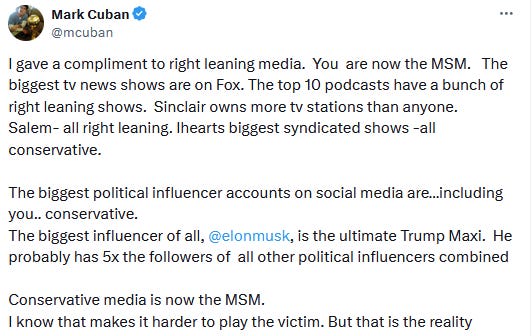
All of these shows and media producers market themselves somewhere in some way as cancelled or silenced or censored or secret or subversive or triggering. That is its primary marketing strategy. It is uncomplicated and reassuring and doesn’t challenge its audience.
It’s a strategy that applies all over the right-wing and/or anti-woke media landscape. Comedians like Ricky Gervais, Jerry Seinfeld, and Tim Allen (and I guess Rob Schneider if I’m going to stretch the definition of comedian) will base their entire careers on how they’re cancelled and not allowed to tell their jokes. The Babylon Bee is notorious for having only three or four not-very-good jokes that they reuse again and again because they don’t really have to understand the function or mechanics of comedy if they can simply market themselves as the right-wing Onion and use the fact that people don’t find them funny as a positive marketing tactic. They can play off the fact that people don’t laugh at their jokes as, oddly, a form of suppression people use against them, and they are thus the victims of a humourless offended elite.
None of these media producers are censored or suppressed in any way that truly means anything, and they may not truly be the “mainstream” either, but it is extremely important to them that they appear censored and that they stay out of the mainstream, all the while, paradoxically, working to ensure that they make their audience think they’re trying to break into the mainstream and escape censorship.
After all, simply imagine what would happen to Daily Wire, Babylon Bee, Joseph Mercola, or any “silenced” podcast or newsletter or documentary or celebrity that suddenly lost the appearance of being censored and gained the appearance of being mainstream?
They would suddenly need to compete on a level playing field. They would have to start making quality media. If they couldn’t, then their careers would end right there. But if they could, then they probably would.
That’s the paradox of censorship grievance media. You have to make something that gets censored, because the alternative is making something good.





